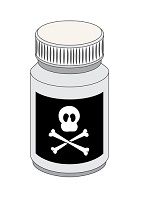Protecting the Liver in Acetaminophen Overdose
Overdoses of acetaminophen can cause liver failure. In promising animal studies, a Bronx team believes it has a potential way to mediate that toxicity.

When people misuse acetaminophen their livers can suddenly fail. The only approved treatment for acemtaminophen toxicity, acetylcysteine, does not always work, comes with side effects and often requires hospitalization.
Montefiore Health System anesthesiology research director, Richard Lopachin, PhD, and his colleague Terrence Gavin, PhD, a chemistry professor at Iona College, may have a better way to prevent liver failure from acetaminophen poisoning, an emergency that occurs for about 70,000 US adults and children annually, according to Montefiore..
In a study published in the Journal of Pharmacology and Experimental Therapeutics, the team reports that trihydroxyacetophenone (THA) treatment may be a more effective antidote.
The researchers earlier work had already proved that dicarbonyl and polyphenol derivatives can prevent toxicity by "mopping up" the damaging compounds that come with acematiminophen overdose.
"Drug-induced toxicity is often mediated by electrophilic metabolites; e.g., bioactivation of acetaminophen (APAP) to N-acetyl-p-benzoquinone imine (NAPQI)," they write "This 1,3-dicarbonyl compound ionizes to form an enolate nucleophile that scavenges NAPQI and other electrophilic intermediates. "
In the new study, they expanded their work to include analyses of the phloretin pharmacophores, 2',4',6'-trihydroxyacetophenone (THA) and phloroglucinol (PG).
The result, as seen in their latest mouse studies, is that the toxins are effectively neutralized before they can do harm.
"The superior ability of THA to protect [the liver] is related to multifaceted modes of action that include metal ion chelation, free radical trapping and scavenging of NAPQI and other soft electrophiles involved in oxidative stress, " they explained in the study.
THA also worked when given either orally or by intraperitonial injection.
"These data suggest that THA or a derivative might be useful in treating drug-induced toxicities and other conditions that involve electrophile-mediated pathogenesis," they concluded.